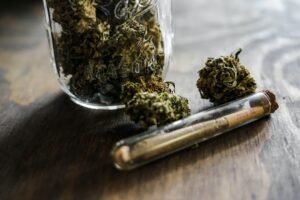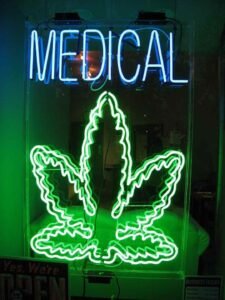The Drug Enforcement Agency has quashed Georgia’s plans to allow the sale of medical marijuana in pharmacies. The Georgia Board of Pharmacy had started accepting applications to dispense medical cannabis products since October and licenses had been granted to 23 independent pharmacies in the state.
However, the Georgia Access to Medical Cannabis Commission, responsible for overseeing the state’s medical marijuana industry cannot override a federal directive preventing pharmacists from providing consultations on medical cannabis, even though it is allowed under state law.
Andrew Turnage, the commission’s executive director, expressed the state’s desire for pharmacists to continue offering consultations for medical cannabis similar to their role with other medications.
However, the DEA has issued a warning stating that sale of marijuana in pharmacies is a breach of federal law.

What is classified as ‘marijuana’?
THC or Tetrahydrocannabinol is the psychoactive chemical compound that results in the “high”. Any chemical possessing more than 0.3% THC is classified as marijuana and is illegal. Georgia state has permitted patients with medical needs to purchase medical marijuana products with up to 5% THC, the recreational type typically contains higher levels.
The U.S. Drug Enforcement Administration (DEA) considers products derived from the cannabis plant with a THC content exceeding 0.3% to be marijuana and classifies it as illegal under federal drug law.
Since 2015, Georgia has allowed patients with specific illnesses and physician approval to possess and consume low-THC medical cannabis products. However, until April, there was no legal means for them to purchase these products within the state.
What are the stances of the other states on marijuana use?
23 states have legalized cannabis for recreational use and 23 other states have legalized some form of medical use of the drug.
Already, marijuana for medical use is available at dispensaries in Georgia. Pharmacies have been put in a tough position with the DEA warning.
Should marijuana be legalized for medical purposes?
It has been widely demonstrated that the prohibition of drugs does little to deter individuals from using them. Even in countries where these substances are banned, determined users, particularly adolescents, find ways to obtain them. Moreover, the illegal drug trade thrives, dominated by black market entities and organized crime. The prohibitionist approach fails to curb drug use while inadvertently contributing to the growth of illicit activities and the circulation of unaccounted funds.
Conversely, legalizing drugsmay also present some advantages for the government. Foremost among them is the potential for substantial revenue generation for the government. Currently, these funds are siphoned off by illegal entities in the black market. By legalizing and regulating drug sales, authorities can redirect these financial resources towards public services and initiatives. Furthermore, the legalization of drugs serves as a potent tool in diminishing organized crime, disrupting the stronghold that illicit drug networks have on society.
A progressive and effective strategy involves treating drug addiction as a health issue rather than a criminal offense. By adopting an approach centered on viewing addiction as an illness, individuals struggling with substance abuse are more likely to seek and receive the necessary assistance. Treating addiction as a health concern not only provides support for those in need but also contributes to a decrease in overall addiction rates. This approach prioritizes rehabilitation over punishment and addresses the root causes of drug dependency.

Source: Neeta Lind, CC BY 2.0, via Wikimedia Commons
Will the federal stance towards marijuana change?
The federal stance on marijuana may undergo a change if a recent proposal to loosen restrictions is approved. In August, the U.S. Department of Health and Human Services suggested removing marijuana from the list of Schedule I substances, where it is currently classified as a high-risk drug, and reclassifying it as a lower-risk Schedule III drug.
This reclassification could signify a shift in the federal government’s approach to the drug, especially in acknowledging it as a substance with a lower risk profile. It is yet to be seen whether this proposal will be adopted and implemented.
India’s stance on marijuana
In India, the possession and consumption of marijuana are illegal according to the Narcotic Drugs and Psychotropic Substances (NDPS) Act. The legislation focuses on the quantity of drugs in possession rather than the purpose and penalties are determined based on the amount of the substance.











Comments 1